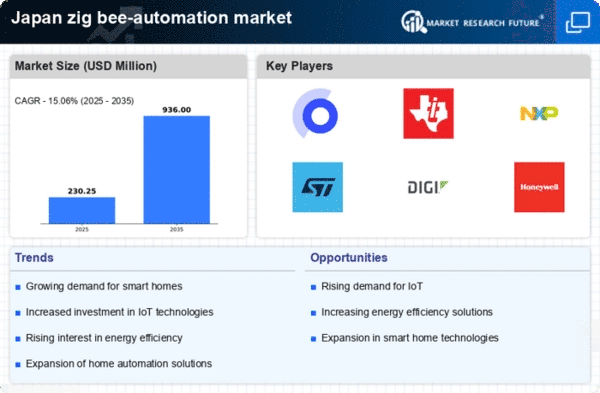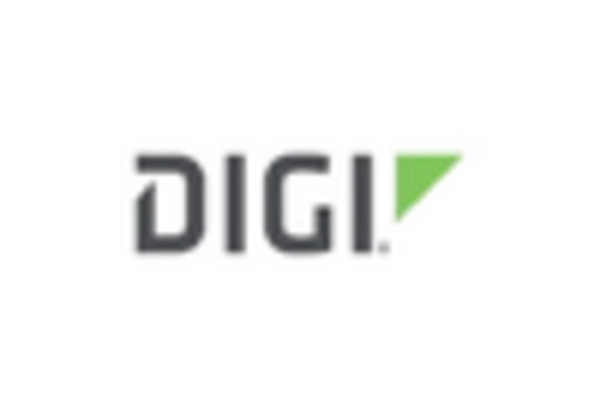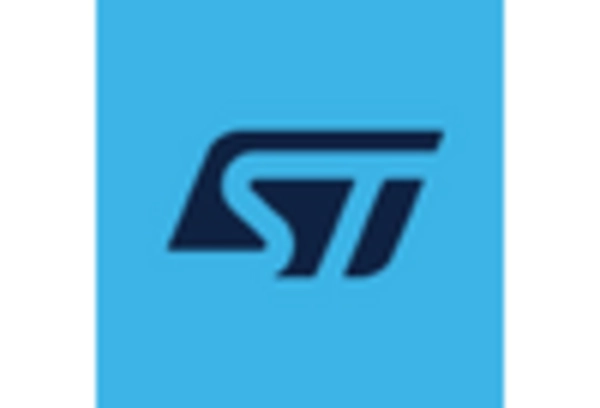Advancements in Zig Bee Technology
Technological advancements in zig bee protocols are playing a pivotal role in shaping the zig bee-automation market in Japan. Innovations such as improved data transmission rates and enhanced energy efficiency are making zig bee devices more appealing to consumers. As of 2025, the market is witnessing a 15% increase in the adoption of next-generation zig bee devices, which offer better performance and reliability. These advancements not only enhance user experience but also facilitate the integration of multiple devices within a single network. Consequently, the will likely benefit from these technological improvements, as they address consumer demands for efficiency and connectivity.
Growing Focus on Security and Surveillance
The increasing emphasis on security and surveillance in residential and commercial properties is driving the zig bee-automation market in Japan. With rising concerns over safety, consumers are investing in smart security systems that utilize zig bee technology for enhanced connectivity and control. As of 2025, the market for smart security devices is projected to grow by 25%, reflecting a shift in consumer priorities towards safety. Zig bee-enabled devices allow for real-time monitoring and alerts, which are crucial for effective security management. This growing focus on security is likely to propel the zig bee-automation market, as more consumers seek integrated solutions that offer peace of mind.
Increased Consumer Awareness and Education
Consumer awareness and education regarding the benefits of automation technologies are significantly impacting the zig bee-automation market in Japan. As more individuals become informed about the advantages of smart home solutions, including energy savings and convenience, the market is likely to expand. Educational campaigns and demonstrations by manufacturers and retailers have contributed to a 20% increase in consumer interest in zig bee-enabled devices. This heightened awareness is fostering a more informed consumer base that is willing to invest in automation technologies. As a result, the zig bee-automation market is poised for growth, driven by a more knowledgeable and engaged consumer demographic.
Rising Demand for Home Automation Solutions
The zig bee-automation market in Japan is experiencing a notable surge in demand for home automation solutions. This trend is driven by an increasing number of consumers seeking convenience and enhanced control over their living environments. As of 2025, approximately 30% of households in Japan have adopted some form of home automation technology, indicating a growing acceptance of smart devices. The integration of zig bee technology allows for seamless communication between various devices, enhancing user experience. Furthermore, the Japanese government has been promoting smart home initiatives, which could further stimulate market growth. This rising demand is likely to propel the zig bee-automation market, as consumers prioritize efficiency and connectivity in their homes.
Government Initiatives Supporting Smart Technology
In Japan, government initiatives aimed at promoting smart technology adoption are significantly influencing the zig bee-automation market. The government has introduced various policies and funding programs to encourage the development and integration of smart technologies in residential and commercial sectors. For instance, the Smart City initiative aims to create urban environments that leverage advanced technologies, including zig bee automation. This initiative is expected to attract investments exceeding $1 billion by 2026, thereby enhancing the market landscape. Such support from the government not only boosts consumer confidence but also encourages manufacturers to innovate and expand their product offerings in the zig bee-automation market.














